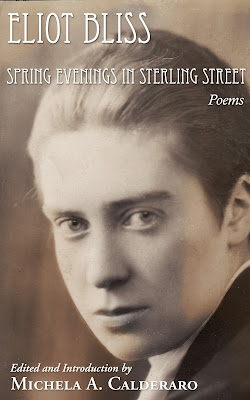Neglected authors
fascinate me. While the particulars for their disregard may vary over time and
from culture to culture, one thing remains constant: their perseverance despite
official recognition. Such is the case of Eliot Bliss, a “white, Creole, and
lesbian” Jamaican novelist and poet whose collected poems have been resurrected
by Michela A. Calderaro in Spring
Evenings in Sterling Street.
In the
introduction to the collection, Calderaro pays tribute to Patricia Allan-Burns,
Bliss’s “faithful companion for about 60 years,” and places Bliss within the
context of Caribbean herstory: “The story of Eliot Bliss is the story of a
mermaid, as Creole women from the Caribbean often envision themselves. Indeed
they are mermaids – half something, half something else.” Calderaro also
provides a brief biography, which traces Bliss’s troubled life from her birth
in Jamaica to England where she died.
We’ll
try to follow Eileen Bliss in her journey to become herself, to witness her struggle to cast off the white British
colonizer’s daughter persona and take on that of the Creole expatriate, not
feeling comfortable in either. We’ll see her transformation from the perfectly educated daughter of a British
army officer to the acclaimed new voice of 1930s London applauded by the elite
literary circles and the scandal of
lesser-known lesbian clubs in that city. And, finally, witness how in her later
years she found herself exiled and forgotten.
Eliot Bliss was
the author of two novels, Saraband
and Luminous Isle and “very few poems
in various journals in the 1920s.” Her poems, however, were never published in
a single volume and Calderaro provides the details of her discovery:
The
poems in this collection were found in 2004 in the little apartment where Eliot
Bliss spent the last years of her life. There were two almost ready collections,
Selection of Poems: 1922-1931 and The Wild Heart: Poems 1922-1929, and
then a considerable number of loose poems – originals and edited versions – in
various places around the house, piled on dusty shelves, inside drawers, inside
old cocktail-bags, some folded in books, others in envelopes. These uncollected
poems are grouped under “Miscellaneous Poems” in this book.
Many of the poems
in Spring Evenings in Sterling Street
display Bliss’s “rich and sophisticated” language. And while poems such as “The
Green Tree,” “If I Write With My Blood,” and “The Chameleon” from Selection of Poems: 1922-1931 and “Rain
During the Night” and “The Departing Amorists” from The Wild Heart: Poems 1922-1929 demonstrate Bliss’s commitment to
her craft and mastery of a carefully wrought line, it is the poems in the
“Miscellaneous Poems”--the poems that she chose not to reveal to the world--that
interest me.
In “Transubstantiation”
and “Introibo ad Altare Dei,”
Calderaro points out that despite their seemingly pious titles, the poems “subvert
religious evocations and transform them into sexual allusions.” I will not
attempt to paraphrase Calderaro’s insightful exegesis of these poems. Instead, I
focus on “The Confession,” where Bliss pursues a similar strategy.
In “The Confession,”
originally titled “The Thief,” the reader is offered a glimpse of the
“inventiveness with words” that Bliss employed in “Transubstantiation” and “Introibo ad Altare Dei.” However, in
“The Confession,” the sonnet form restrains her choice of rhyme, yet frees her
to explore the theme of unrequited love.
In the first four
lines, the speaker provides the context for her seeming act of penitence:
Shall
I confess to you I am a thief,
And
do your gracious absolution ask?
Would
you Confessor, promise me relief
If
I should set myself to this silly task?
The use of the
word “silly” undermines the supposed piety of the confessor and signals the
unrepentant tone of the poem:
How
sweet would perils be, if you but were
My
judge, to weigh the balance of my crimes,
And
to impose a punishment severe,
To
hear your voice I’d sin a thousand times!
Then, at the volta, Bliss introduces the motive for
the “confession”:
Yes,
I will risk your high and dread displeasure,
Last
night I lay beside you in a dream
And
stole your love, and broke into your treasure
Of
hidden wealth; and strangely it did seem
That
your delight nigh equalled mine! I know
I
only dreamt it – do not tell me so!
What intrigues me is
the clever subterfuge of dream that Bliss uses for the speaker’s desire for the
consummation of love: “Last night I lay beside you in a dream/And stole your
love, and broke into your treasure/Of hidden wealth,” and then, in a plea of
recognition asserts, “and strangely it did seem/That your delight nigh equalled
mine! I know/I only dreamt it – do not tell me so!”
According to the
American poet Robert Frost, “Poetry provides the one permissible way of
saying one thing and meaning another.” The tension of paradoxical utterance is
the source of poetic complexity and rewards with repeated readings. Eliot
Bliss’s work embodies this principle and Calderaro is to be congratulated for recovering
these poems from obscurity, and for bringing them back to our attention.
Kindle Edition
About the Author
Michela A.
Calderaro an Associate Editor of Calabash: A Journal of Caribbean Arts
and Letters, teaches English and Postcolonial Literature at the
University of Trieste (Italy). Dr. Calderaro's critical works include a book on
Ford Madox Ford and numerous articles on British, American and Anglophone
Caribbean writers.

1 comment:
Neglected authors fascinate me. While the particulars for their disregard may vary over time and from culture to culture, one thing remains constant: their perseverance despite official recognition. Such is the case of Eliot Bliss, a “white, Creole, and lesbian” Jamaican novelist and poet whose collected poems have been resurrected by Michela A. Calderaro in Spring Evenings in Sterling Street.
Post a Comment